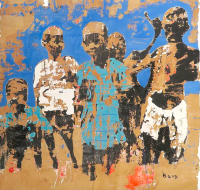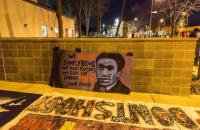Franz Fanon
Articles tagged with Franz Fanon
Tag Archive
- african art
- Afro-Port
- América Latina
- anarchy
- Angolan Journalist
- angolanidade
- artists
- artivism
- asian workers
- Basileia
- Benjamin Lebrave
- body
- Camaroon
- Carlos Nô
- Ceramics
- chinese
- choreographer
- Coloniality
- conversas
- cultural memory
- Danças africanas
- dd
- Deleuze
- Délio Jasse
- desert
- end sars movement
- equality
- Europa
- european union
- Exhibition-Fair Angola 1938
- Feira
- Felwine Sarr
- freedom
- fronteiras
- Hanami
- historicism
- history of Africa
- in transit
- installation
- international relations
- Ireland
- Jogos Sem Fronteiras
- José Cabral
- Krik-krak
- Kurt Kohlstedt
- language diversity
- Leila Kilani
- LGBTQI
- língua portuguesa
- literatura angolana
- Lunda
- Mais um Dia de Vida: Angola 1975
- Malangatana
- Malcom X
- mamela nyamza
- Mangueira
- Meet
- meteorisation
- mexican
- Mimesis
- Mississippi
- mudança
- museu da memória
- Music
- não dança?
- Nicholas Mirzoeff
- Nigeria
- Noz de cola
- occupy Wall Street
- ocupações temporárias
- painting
- paraíso
- performance
- polish photography
- Política Cultural
- political protests
- pos-colonial
- post-colonial contemporary art
- preforming artists
- Prints
- programation
- Quem mora nesta Buala
- raça
- representações de áfrica
- S.Tomé
- safari
- Senhor dos Milagres Escravo de Angola
- sexuality
- símbolos
- social rights
- statues
- Stuart Hall
- surname
- The Current Situation
- The Party of the Dead
- Tia
- transnational
- video
- William Kentridge
- Zé da Guiné
 In his view, “either a society is racist or it is not” and “colonial racism is no different from other racisms.” It is when he tries to explain a key idea and expose a scandal that his poetic and rhetorical prose unfolds. Besides, for him, the liberation of the native means rejecting this interdicted world and embracing the “self” denied by the colonizer, who sees him as disorganised and docile: “The native is a being hemmed in; apartheid is simply one form of the division into compartments of the colonial world.
In his view, “either a society is racist or it is not” and “colonial racism is no different from other racisms.” It is when he tries to explain a key idea and expose a scandal that his poetic and rhetorical prose unfolds. Besides, for him, the liberation of the native means rejecting this interdicted world and embracing the “self” denied by the colonizer, who sees him as disorganised and docile: “The native is a being hemmed in; apartheid is simply one form of the division into compartments of the colonial world.  I want to first discuss the politics around teaching Fanon in today’s postcolonial world, and in particular in a post-Brexit Britain. What is it about Fanon that captures the hearts and minds of so many students, particularly students of colour? I then want to discuss the continuing debate around Fanon’s relationship to Marxism, looking at some of the ways in which Fanon’s work provides a refreshing lens on capitalism in the postcolonial world.
I want to first discuss the politics around teaching Fanon in today’s postcolonial world, and in particular in a post-Brexit Britain. What is it about Fanon that captures the hearts and minds of so many students, particularly students of colour? I then want to discuss the continuing debate around Fanon’s relationship to Marxism, looking at some of the ways in which Fanon’s work provides a refreshing lens on capitalism in the postcolonial world. 